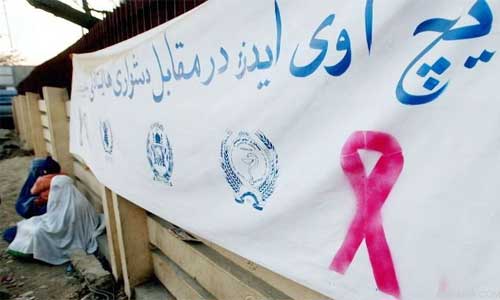December 01, the international AIDs/HIV Day Marked in Afghanistan. According to officials reports, the coronavirus pandemic has hampered treatment of the HIV/AIDS patients in Afghanistan while the country had a high place in fighting against AIDs/HIV in recent years. For example, in 2018 Afghanistan won the first place in fighting against AIDs/HIV in global level and so WHO had appreciated the country by giving special appreciation letter to Afghanistan. In that time, the number of AIDs/HIV was estimated about 5900 with 2700 positive cases registered in the ministry of health, but now 7,749 infected people are reported with more than 3,000 of them have been registered by the health ministry with 761 of them are women. However, the real positive cases seem to be more than what is reported under shadow of second wave of covid-19 in Afghanistan.
According to experts, there are many factors behind the rise of AIDs/HIV such as overridden by covid-19 issues, social traditions, heavy expenses of legal marriage, increase of its transmission through increase of addiction, substandard blood distribution centers, social interactions with foreigners and more importantly lack of public awareness. It is said that nearly 35 million people are hosting AIDs/HIV in their body in global level while estimated 19 million of them are unaware of the unwanted guests. Currently, the AIDs/HIV exist in 50 countries but the disease persists in those countries which are in the least informational and educational level. For example, it largely exist in middle east countries, south east countries and African countries that often described as the third world countries. In first world countries, almost all people are encouraged to take volunteer blood test and almost all people are aware of the virus and its preventive measures but in Afghanistan the patients do not go to doctors unless they reached in critical level. Undoubtedly, persistence of this condition will surprise a large number of people in the future.
As pointed out, one of the main factor behind spread of AIDs/HIV is negative role of social tradition in which people hide their disease and feel shy to share it with their family, society and health experts. Unfortunately, Afghanistan is one of the countries which is still trapped in many superstitious traditions while it lies in the age of science and technology. From one hand the patients are already conservative; on the other hand, they are faced with poor treatment in social and educational settings which farther worsen the situations. Therefore, when some ones are diagnosed with the virus they will loses all hope and leading to panic and fear. Many people living with HIV are at an increased risk of developing mood swings, cognitive or anxiety disorders. These can severely affect the nervous system.
Therefore, we need to provide a suitable platform for dealing with the desease in our society. AIDs/HIV is a virus only transmitted from person to person and so all social groups such as media, cultural-educational centers and people should play a constructive role in controlling this disease.
The next transmissive factor is substandard health services, especially the substandard blood distribution centers in the country. It is said that in many cases, especially in distant parts of the country, there is no definitive assurance about healthiness of blood products and facilities in blood distribution centers. Therefore, the negligence of health workers can largely help in the spread of the disease in the country. the public health sector must supervise the health centers how they apply their limited facilities which can be the carriers of the disease. They should not belittle the life of people that all sharp objects used in ear piercing, cupping, tooth reconstruction and tooth extraction can transmit disease from one to others.
The third but the most dangerous factor is addiction. Unfortunately, more than 3 million people are estimatively addicted in Afghanistan while most of them jointly use the same needle to inject addictive drugs. The addicted people neither have fiscal ability to frequently buy fresh needles nor they are aware of such dangerous disease that might trap many at once. Unfortunately, the issue of addiction has not only considered the main factor behind the rise of AIDs/HIV in the country but also the mother of many problems in the country such as increase of social insecurity, family violence, prostitution and even the disintegration of families. If we calculate the psychological, economic and social implications which come from addictions, the estimated 3 million addicted people will create 3 million problems for their sisters, daughters, mothers, spouse and also for their society every day. Therefore, the phenomena of addiction is a serious national issue and so must be exceptionally tackled in Afghanistan.
Given our poor health facilities, we need to re-emphasize the importance of social and legal awareness about AIDs/HIV in Afghanistan. In fact, this is the easiest strategy for Afghan people and government to fight against the disease. We need to encourage the culture of self-testing, especially after contact with suspicious people. Many countries support HIV self-testing so as to prevent from farther extension of the virus. Based on scientific study, nearly 70 percent people whose partners were affected by the virus, they have also been infected with the virus. Therefore, awareness and self- testing strategy, especially for those who doubts about their health status is very important.
In addition to these, promoting the culture of legal marriage, supervision of the legal and illegal migrants come from suspicious countries are also important. And as a last point, there must be a legal punishment for those who indolently or deliberately transmit the virus to others.
Home » Opinion » The Rise of AIDs/HIV under Shadow of Covid-19 in Afghanistan
The Rise of AIDs/HIV under Shadow of Covid-19 in Afghanistan
| Mohammad Zahir Akbari

